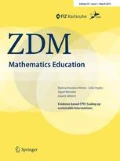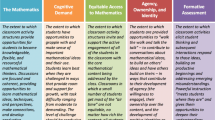Abstract
Research on mathematics teacher knowledge, including work on mathematical knowledge for teaching, draws heavily on Shulman’s categories of teacher knowledge. These categories have been adopted, developed and modified by mathematics education researchers. This approach has led to some valuable insights. In this paper, I draw on discursive psychology to develop a critique of this work. This critique highlights some of the unstated assumptions of much research inspired by Shulman’s work, including, in particular, a representational view of knowledge and argues that the resulting theories do not reflect the discourses of knowledge that arise in mathematics classrooms. These ideas are illustrated with discussion of two examples, with the aim of showing how discursive psychology can offer an alternative perspective.
Similar content being viewed by others
References
Askew, M. (2008). Mathematical discipline knowledge requirements for prospective primary teachers, and the structure and teaching approaches of programs designed to develop that knowledge. In P. Sullivan & T. Wood (Eds.), The international handbook of mathematics teacher education: vol 1. Knowledge and beliefs in mathematics teaching and teaching development (pp. 13–35). Rotterdam: Sense.
Ball, D. L., & Bass, H. (2000). Interweaving content and pedagogy in teaching and learning to teach: Knowing and using mathematics. In J. Boaler (Ed.), Multiple perspectives on the teaching and learning of mathematics (pp. 83–104). Westport: Ablex.
Ball, D. L., Lubienski, S. T., & Mewborn, D. S. (2001). Research on teaching mathematics: the unsolved problem of teachers’ mathematical knowledge. In V. Richardson (Ed.), Handbook of research on teaching (4th ed.). New York: Macmillan.
Ball, D. L., Thames, M. H., & Phelps, G. (2008). Content knowledge for teaching: What makes it special? Journal of Teacher Education, 59, 389–407.
Barwell, R. (2009). Researchers’ descriptions and the construction of mathematical thinking. Educational Studies in Mathematics, 79(2), 255–269.
Barwell, R. (2012). Discursive demands and equity in second language mathematics classrooms. In B. Herbel-Eisenmann, J. Choppin, D. Wagner, & D. Pimm (Eds.), Equity in discourse for mathematics education: Theories, practices, and policies (pp. 147–164). New York: Springer.
Borko, H., Eisenhart, M., Brown, C. A., Underhill, R. G., Jones, D., & Agard, P. C. (1992). Learning to teach hard mathematics: Do novice teachers and their instructors give up too easily? Journal for Research in Mathematics Education, 23(3), 194–222.
Edwards, D. (1993). But what do children really think?: Discourse analysis and conceptual content in children’s talk. Cognition and Instruction, 11(3&4), 207–225.
Edwards, D. (1997). Discourse and cognition. London: Sage.
Edwards, D., & Potter, J. (1992). Discursive psychology. London: Sage.
Edwards, D., & Potter, J. (2001). Discursive psychology. In A. W. McHoul & M. Rapley (Eds.), How to analyse talk in institutional settings: A casebook of methods (pp. 12–24). London: Continuum.
Foster, C. (2011). Peripheral mathematical knowledge. For the Learning of Mathematics, 31(3), 24–26.
Garfinkel, H. (1967). Studies in ethnomethodology. Englewood Cliffs: Prentice Hall.
Goldin, G. (2002). Representation in mathematical learning and problem solving. In L. D. English (Ed.), International handbook of research in mathematics education (pp. 197–218). Mahwah: Lawrence Erlbaum.
Hill, H. C., Blunk, M. L., Charalambous, C. Y., Lewis, J. M., Phelps, G. C., Sleep, L., et al. (2008). Mathematical knowledge for teaching and the mathematical quality of instruction: an exploratory study. Cognition and Instruction, 26, 430–511.
Hill, H. C., Rowan, B., & Ball, D. L. (2005). Effects of teachers’ mathematical knowledge for teaching on student achievement. American Educational Research Journal, 42, 371–406.
Hodgen, J. (2011). Knowing and identity: A situated theory of mathematics knowledge in teaching. In T. Rowland & K. Ruthven (Eds.), Mathematical knowledge in teaching (pp. 27–42). Dordrecht: Springer.
Koellner, K., Jacobs, J., Borko, H., Schneider, C., Pittman, M. E., Eiteljorg, E., et al. (2007). The problem-solving cycle: A model to support the development of teachers’ professional knowledge. Mathematical Thinking and Learning, 9(3), 273–303.
Lerman, S. (2001). A review of research perspectives on mathematics teacher education. In F.-L. Lin & T. J. Cooney (Eds.), Making sense of mathematics teacher education (pp. 33–52). Dordrecht: Kluwer.
Petrou, M., & Goulding, M. (2011). Conceptualising teachers’ mathematical knowledge in teaching. In T. Rowland & K. Ruthven (Eds.), Mathematical knowledge in teaching (pp. 9–25). Dordrecht: Springer.
Potter, J., & Wetherell, M. (1987). Discourse and social psychology: Beyond attitudes and behaviour. London: Sage.
Putnam, R. T., & Borko, H. (2000). What do new views of knowledge and thinking have to say about research on teacher learning? Educational Researcher, 29(1), 4–15.
Reis, G., & Barwell, R. (2012). The interactional accomplishment of not knowing in elementary school science and mathematics: Implications for classroom performance assessment practices. International Journal of Science and Mathematics Education. doi:10.1007/s10763-012-9377-5.
Rowland, T., Huckstep, P., & Thwaites, A. (2005). Elementary teachers’ mathematics subject knowledge: The Knowledge Quartet and the case of Naomi. Journal of Mathematics Teacher Education, 8, 255–281.
Sacks, H. (1992). In G. Jefferson (Ed.), Lectures on conversation. Oxford: Blackwell.
Shulman, L. S. (1986). Those who understand: Knowledge growth in teaching. Educational Researcher, 15(2), 4–14.
Shulman, L. S. (1987). Knowledge and teaching: Foundations of the new reform. Harvard Educational Review, 57(1), 1–22.
Steele, M. D., & Rogers, K. C. (2012). Relationships between mathematical knowledge for teaching and teaching practice: The case of proof. Journal of Mathematics Teacher Education, 15, 159–180.
Sullivan, P., & Wood, T. (2008). The international handbook of mathematics teacher education volume 1: Knowledge and beliefs in mathematics teaching and teaching development. Rotterdam: Sense.
te Molder, H., & Potter, J. (2005). Conversation and cognition. Cambridge: Cambridge University Press.
Zazkis, R., & Mamolo, A. (2011). Reconceptualizing knowledge at the mathematical horizon. For the Learning of Mathematics, 31(2), 8–13.
Author information
Authors and Affiliations
Corresponding author
Rights and permissions
About this article
Cite this article
Barwell, R. Discursive psychology as an alternative perspective on mathematics teacher knowledge. ZDM Mathematics Education 45, 595–606 (2013). https://doi.org/10.1007/s11858-013-0508-4
Accepted:
Published:
Issue Date:
DOI: https://doi.org/10.1007/s11858-013-0508-4




